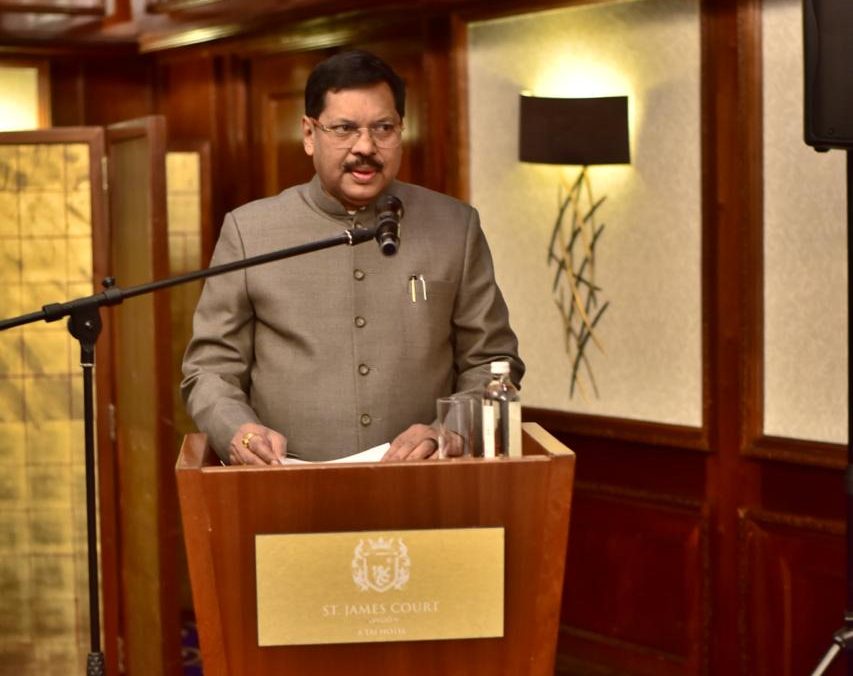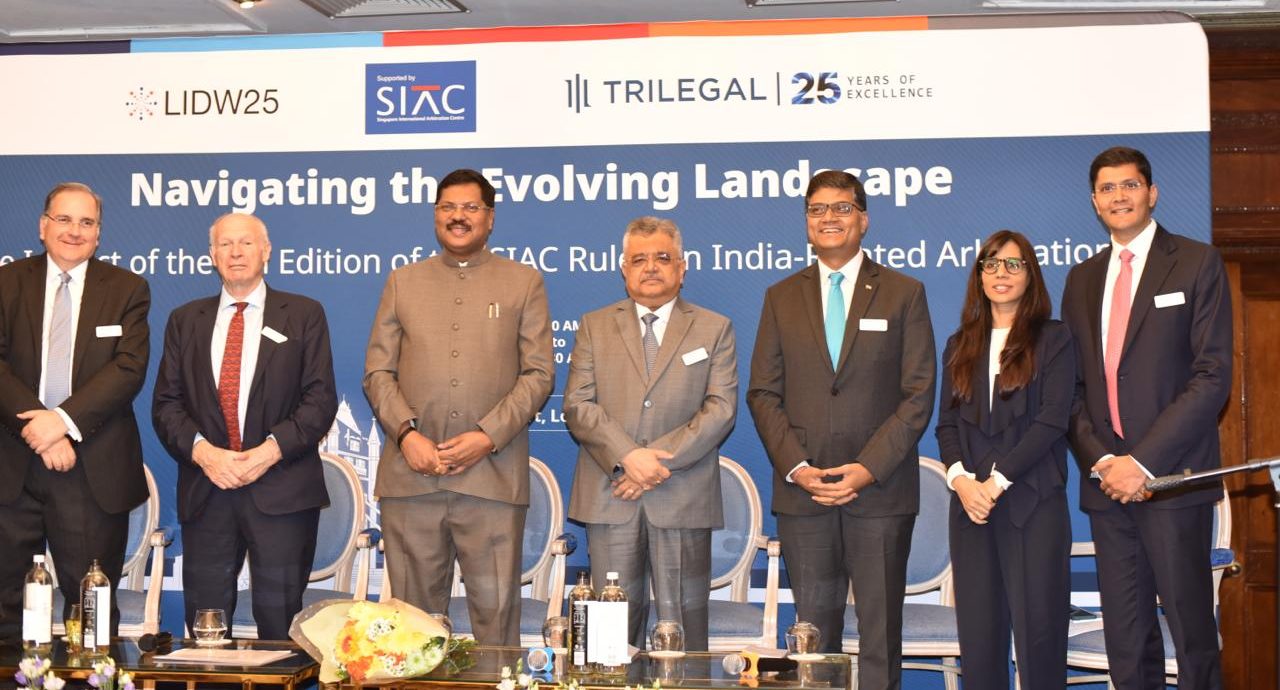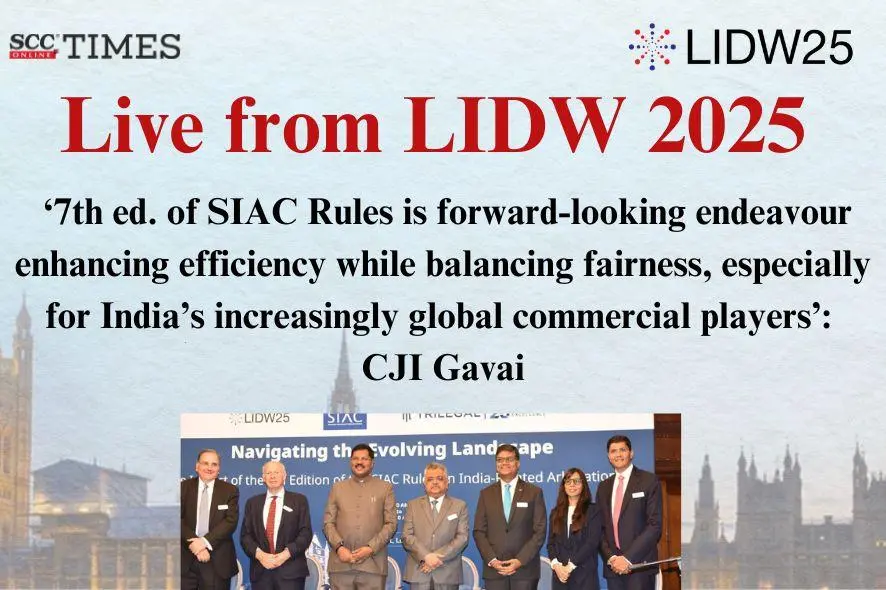The Singapore International Arbitration Centre (‘SIAC’) continues to cement its position as a forum of choice for India-related international arbitrations, thanks to its reputation for neutrality, efficiency, and innovation. Today’s session focuses on the impact of the recently released 7th Edition of the SIAC Rules, which introduces several key developments aimed at enhancing procedural flexibility and institutional robustness.
Panelists explore new tools such as the Streamlined Procedure, Preliminary Determination, and Coordinated Proceedings, as well as the significant addition of ex parte protective preliminary orders available through Emergency Arbitrators. The revised Rules also feature updated arbitrator appointment provisions, and a broader framework designed to promote integrity and efficiency throughout the arbitral process.
This high-level discussion brings together an impressive panel of leading arbitration practitioners, senior general counsel, and institutional figures. Together, they examine whether these changes reinforce SIAC’s appeal for India-focused disputes and assess their potential influence on best practices in regional dispute resolution.
The session offers participants timely insights and practical guidance on navigating the evolving arbitration landscape and adapting to the strategic opportunities and challenges posed by SIAC’s latest rule changes.
This distinguished session brings together some of the most influential voices in the international arbitration and legal community:
- Justice B.R. Gavai, Chief Justice of India
- The Rt. Hon. Lord David Neuberger of Abbotsbury, former President of the UK Supreme Court
- Tushar Mehta, Solicitor General of India
- Darius Khambata, Senior Advocate; Member, SIAC Court of Arbitration
- Shwetha Bidhuri, Director & Head (South Asia), Singapore International Arbitration Centre (SIAC)
- Sapan Gupta, Vice President — Group General Counsel, ArcelorMittal
-
Sidharth Sharma, Group General Counsel, Tata Sons
Moderated by:
-
Nitesh Jain, Partner, Trilegal
Session Hosts:
- Trilegal
-
Singapore International Arbitration Centre
Justice Gavai addresses the distinguished audience, remarking, “It is a privilege to address such a distinguished gathering at London International Disputes Week, a platform where some of the world’s foremost legal minds converge to shape the future of arbitration.”
He extends “heartfelt appreciation to the Singapore International Arbitration Centre (SIAC) and Trilegal” for hosting an insightful session focused on the evolving dynamics of arbitration.
Turning attention to the 7th Edition of the SIAC Rules, Justice Gavai underscores its significant impact on India-related arbitrations, noting that the contemporary global order is undergoing rapid transformation across economic, political, and social domains. These shifts, he observes,
“call for a corresponding evolution in the mechanisms for the administration of justice, making platforms like this more relevant than ever.”
He reflects on the shift in dispute resolution, stating that what was once confined to traditional courtroom boundaries has now undergone a profound transformation, with arbitration emerging as a central instrument in this evolution.

“Arbitration today represents a substantive recalibration of how justice is understood and delivered,” Justice Gavai explains.
He refers to the Arbitration and Conciliation Act, 1996, as “the backbone of India’s arbitration framework, which encompasses domestic arbitration, international commercial arbitration, and the recognition and enforcement of foreign awards.”
He furthers by spotlighting the strong judicial and commercial cooperation between India and Singapore, particularly referencing the 2023 Memorandum of Understanding signed between the Supreme Court of India and the Supreme Court of Singapore, on behalf of the two Chief Justices.
He remarks, “Singapore’s bigger infrastructure, institutional support, utility and efficiency have made it a preferred fit for arbitration globally and more particularly for the Indian parties.”
He reflects that the release of the 7th Edition of the SIAC Rules, effective from 04-01-2025, marks a significant milestone in the evolution of institutional arbitration.
“The new rules introduce a range of innovative mechanisms, specifically designed to enhance procedural efficiency, reduce costs, and uphold the core principles of fairness and party autonomy”, he notes.
Justice Gavai notes that another notable feature of the 7th Edition of the SIAC Rules is the introduction of provisions for coordinated proceedings. He explains, “This facility proves particularly useful in cases involving multiple arbitrations arising out of related transactions, where similar questions of fact or law are at stake.” Under this mechanism, he adds, “parties may apply to consolidate or coordinate such proceedings before the same arbitral tribunal, thereby promoting consistency, efficiency, and judicial economy.”
Focusing on the SIAC Rules, Justice Gavai remarks that this update “demonstrates the progressive development and codification of arbitration practice by providing clear and explicit guidance to tribunals.” He adds, “The 7th Edition of the SIAC Rules represents a significant milestone in enhancing the efficiency of arbitrations globally, especially for India-related disputes.”
While concluding his address, he emphasises that, “combined with the strong and supportive legal systems of both Singapore and India, these rules can play a vital role in promoting business activities.” By “strengthening dispute resolution mechanisms,” he notes, “they will build greater confidence among international investors, encouraging cross-border business engagements through a reliable forum for resolving disputes.”
“The 7th Edition of the SIAC Rules can significantly reduce the uncertainties often associated with cross-border transactions, thereby making India and Singapore even more attractive destinations for investment and trade,” he remarks.
Concluding, he notes,
“I’m happy to acknowledge that the 7th edition of the SIAC Rules is a forward-looking endeavor aimed at enhancing efficiency while balancing fairness, especially for India, whose commercial players are increasingly global in outlook and operations.”

The panel takes it forward, delving deeper into the practical implications of the SIAC Rules and the future of India-Singapore arbitration dynamics.
Shwetha Bidhuri, remarks, “The new rules reflect SIAC’s experience managing over 3,000 cases under the 2016 rules and were developed with careful consideration of evolving practices.”
She explains that SIAC’s practical experience led to targeted reforms in the rules to enhance procedural efficiency.
“Our experience handling numerous cases highlighted the need to introduce measures that make the arbitration process more efficient for all parties involved. The draft rules were introduced in 2023 and developed following an extensive consultation process, primarily with the SIAC Users Council.”
Bidhuri further adds, “We engaged multiple stakeholders—including in-house counsel, the arbitration community, government representatives, academics, and students—through several sessions, some of which were closed-door, to gather comprehensive feedback on the draft and its provisions.”
Addressing a key question on what was modified in the final version of the rules, she cites the example of publication of awards. “The draft proposed deemed consent for publication unless a party objected within six months. However, stakeholders emphasised the importance of confidentiality. As a result, the final rules require explicit agreement from the parties before an award can be published, and any publication must be in redacted form.”
Bidhuri goes on to highlight another significant update in the rules concerning emergency arbitration. She explains that the draft had proposed shortening the existing 14-day timeline for emergency arbitrators to issue orders.
She notes, “The draft suggested shortening the 14-day timeline for emergency arbitrators to issue orders, based on observed practice where decisions often came in about 10 days.” However, she shares that feedback from stakeholders played a critical role in shaping the final outcome. “Feedback indicated that shortening the timeline further would be too restrictive, so the 14-day period was retained, though in practice many decisions still come faster,” she states.







